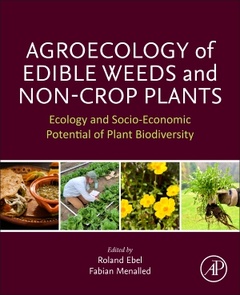Agroecology of Edible Weeds and Non-Crop Plants Ecology and Socio-Economic Potential of Plant Biodiversity
Coordonnateurs : Ebel Roland, Menalled Fabian

Agroecology of Edible Weeds and Non-Crops: Ecology and Socio-Economic Potential of Plant Biodiversity is the first book to move beyond the ethnobotanical aspect of under-utilized non crops to explore how to optimize their potential. With case studies of edible weeds and non-crop plants from around the world, including Europe and North America, in urban as well as rural settings, the book highlights the global opportunities provided by these plants. The book includes much needed information for identifying, maintaining, and benefitting from these plant species. It is ideal for agricultural professionals, educators, researchers, and students. Those interested in increasing the diversity of the farming landscape and food systems by means of edible non-crop plants have access to a plethora of information on the ethnobotany of these species. Yet little to no information exists on the agroecological requirements and potential benefits of underutilized edible non-crop plants in the context of sustainable farming systems. This book fills that knowledge gap from identifying edible weeds and non-crop plants, to exploring the ways these plants can be used to economically improve nutrition.
- Introduction: Edible weeds. A need for an agroecological perspective.
- Agroecology of edible weeds
- Ecological principles in the study of edible weeds.
- Biogeography of edible weeds.
- Management practices to enhance the abundance of edible weeds within different agricultural landscapes.
- Ecological, cultural, and socioeconomic criteria for diversifying weed use as food.
- Impact of edible weeds on other components of the associated biodiversity.
- Economic and social implications of edible weeds
- Edible weeds as a component of a resilient food system.
- Weeds as a social construct.
- The economy of edible weeds.
Nutrition-sensitive agroecology highlights the importance of wild foods.
- Case studies: agroecology of edible weeds in industrialized and developing regions
- Edible weedy plants for food security and sovereignty in NW Patagonia.
- Flixweed: a weed, a cover crop, an edible plant.
- “Quelites: The culture of edible weeds in Mexico.
- Agroecological systems and edible weeds in Nepal.
- The agroecology of edible weeds in Africa.
- Edible weeds of the Caribbean: agroecology and use.
- Edible weeds in different agroecological mulching systems in Piedmont, NW Italy.
- Agroecology and use of edible weeds among Native Americans.
- Itajetik: Food culture and agroecology of edible weeds from the Tseltal Maya milpa in northern Chiapas.
- Visualizing for advocacy: the role of non-cultivate species in highlands communities in Veracruz.
- Agroecology of edible weeds in India.
- Edible weeds: a case study from Solomon Islands.
- Ecology of edible weeds in urban settings and social perception of weeds as food.
- Looking forwards: approaches to foster ecological management of edible weeds and promote the persistence of diverse agroecosystems and foods.
Dr. Menalled is a Professor in Weed Ecology and Sustainable Agriculture at Montana State University (MUS). He received a BS in Biology at the University of Buenos Aires, Argentina, and a Ph.D. in Forest Ecology at the University of Massachusetts, Amherst, while conducting agroforestry research at the Biological Station La Selva, Costa Rica. His research and education program at MSU focuses on understanding the ecological underpinnings of sustainable cropping systems. This program embraces a multi-disciplinary approach to address both basic and applied problems facing the agricultural communities. Core areas of research include 1) Patterns and functional importance of the associated biodiversity in conventional and alternative cropping systems, 2) Assessment of multi-trophic pest management interactions in agroecosystems, and 3) Development of integrated weed management practices. As main author or co-author, Dr. Menalled published 114 peer-revied articles, 15 book chapters, two b
- Evaluates ecological processes underpinning the abundance and diversity of edible non-crop plants
- Assesses ecological benefits of these species within agroecosystems
- Identifies socioeconomic barriers and incentives in exploiting consumable agricultural biodiversity
- Highlights real-world insights through case studies
Date de parution : 10-2024
Ouvrage de 300 p.



